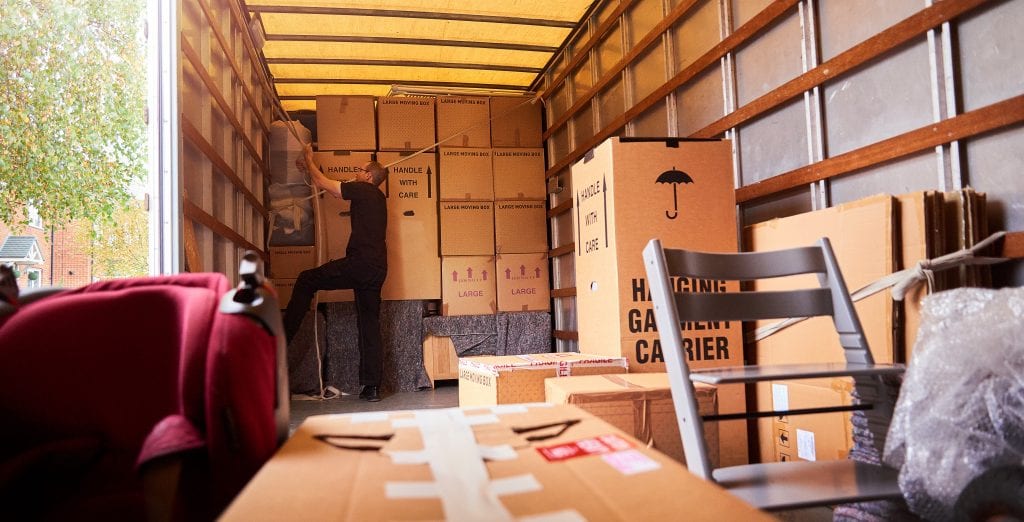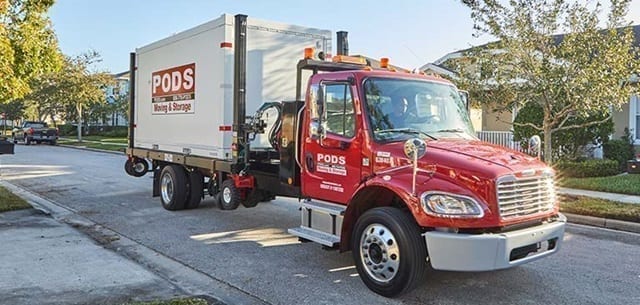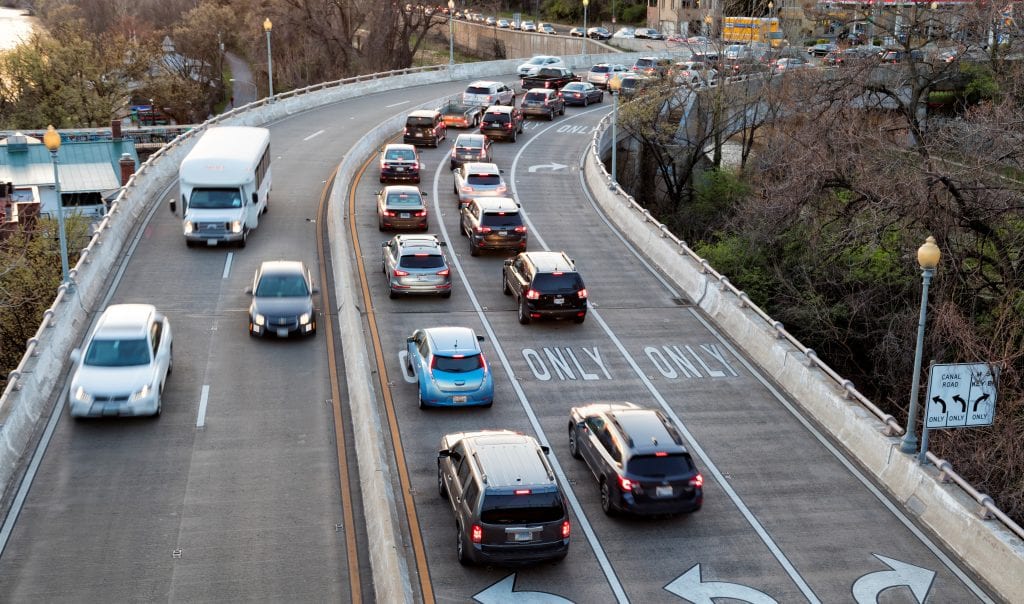
Moving in DC: A Guide to Moving in and out of the DC Metro Area
Washington DC
Now that the hard work of finding your new home is done – or you’ve at least decided on temporary housing -- it’s time to plan your move for a minimum of stress and DC-style moving drama.
Whether you’re moving locally in the DC metro area, or moving out of the city to relocate to another part of the country, it’s best to know something about your options when it comes to getting from Point A to Point B. (Note: When referring to the DC area, this article covers the District as well as Northern Virginia and Maryland suburbs.)
Before researching DC moving services, truck rentals, and moving containers, it will help to think through these factors:
- How much stuff do you have to move?
- What’s your budget and timing?
- Do you need storage and scheduling flexibility?
- Are you looking for contactless moving to reduce risks of COVID-19 spread?
- How much work are you willing and able to do yourself? Do you have friends or family who can help?
- Are you moving in an urban area that has parking restrictions?
What are your options for moving in DC?
Unless you’ve adopted an ultra-minimalist lifestyle, you’ll probably need more than a car to haul your stuff. When choosing your moving options, keep in mind that the district presents special challenges, between its notoriously dreadful traffic and limited city parking, which can be nerve-wracking if you’re driving a huge rental truck. That said, you still have five main options for moving:
- Traditional full-service mover
- Moving container service
- Moving container service specialized for city moves
- Rental truck
- A combination of the above
Let’s take a look at moving costs, how each service works, and its pros and cons.
How much does it cost for a local move in DC?
To help with early planning, here are rough estimates for local moving costs for a moderately furnished 2- to 3-bedroom household, based on pricing from PODS and the MoveBuddha Moving Cost Calculator. Be sure to get your own estimates based on your specific move, as pricing will vary depending on the amount of stuff you’re moving and the number of miles:
DC local moving costs will range from $49* on the low side for rental trucks to $2,321* on the high end for a traditional mover. If you go with a PODS moving container, the cost to move locally in DC is usually between $499* to $544*, including one-month built-in storage, either in your driveway or at a secure Storage Center, with standard delivery and pickup service.
| Household Size | Full-Service Movers | PODS | Rental Truck |
| 2-3 Bedroom (800-1,200 sf) | $1,598-$3,474 | $850-$999 | $142-$217 |
| Moving from DC to Richmond or points beyond? For cost estimates to three popular destinations from DC, jump to the sections below: -- DC to Richmond -- DC to Raleigh, NC -- DC to Boston, MA |
What does it cost to move From DC to other parts of the country?
Long-distance moving costs depend on distance, the amount of stuff you’re moving, and market conditions in your destination city. Here are some rough estimates for the three main types of moves:
- Truck rentals for long-distance moves average $971 plus incidentals, according to HireAHelper, while MoveBuddha estimates a range of $2,000 to $4,000+ for cross-country moves.
- Traditional full-service movers for moves over 1,000 miles range in cost from $950 to $8,400+, according to MoveBuddha.
- PODS portable containers will usually cost from $1,237 to $2,999 for long-distance moves, including one month for storage.
Now that you've got an idea of costs, let’s take a look at each type of service and its pros and cons.

Traditional Movers: Working with DC Moving Companies or Long-Distance Movers
If you prefer to have as little to do with the moving process as possible, hiring pro movers to do it all may be the best choice for you. That being said, it’s also usually the most expensive. Full-service movers will do all the truck driving, loading and unloading. For an added fee, they’ll also take care of the packing and unpacking, and even furniture disassembly and reassembly.
When you’re checking out Washington, DC moving companies, start by asking for referrals from friends, family, realtors, and rental agents – and get three estimates in writing. When you’re comparing estimates, be wary of unusually low bids, as it could be a scam.
Here are some key points to cover with moving companies:
- Check their licensing and online reviews.
- Ask if they’ll be using subcontractors.
- Find out how their scheduling works and how they handle date changes.
- Ask about the deposit, cancellation, and refund policy.
- Find out if there are any extra fees for stairs, extra-heavy items, or other factors.
- If you need storage, ask if it’s available, and get details on costs and access.
Full-Service Moving Companies: Pros and Cons
| Pros | Cons |
| No heavy lifting | Expensive |
| No driving a huge truck | Schedules can be rigid |
| Less hassle if it’s a good company | In-home estimates often required |
| Extra services available | Potential for extra fees |

Moving PODS Containers
If you’d rather not pay the hefty price for full-service movers, but you’re not inclined to maneuver a truck through those narrow DC streets and insane traffic circles (they’re scary enough in a car!), then a moving container service may be just the right solution. Portable container services like PODS offer an affordable option -- especially if you need storage, more flexibility, or just prefer to take more time than the usual moving day fire drill. The built-in storage can also come in super handy for decluttering and home staging to increase sales appeal.
How PODS standard service works:
- The container is delivered to you.
- You take your time loading it up to the brim.
- PODS picks it up and takes your container to your new place.
- When you’re done unloading, PODS picks up your container.
- Take a full 30 days to move or pay a monthly rental fee for more time.
- If needed, PODS can keep your loaded container at a secure storage center
The process is pretty simple. While it’s ideal to have a driveway or apartment complex parking lot where you can keep the container, DC’s transportation department offers special container parking permits with advance purchase if your location doesn’t have rush hour or street sweeping restrictions.
Moving and Storage Container Services: Pros and Cons
| Pros | Cons |
| Less expensive than full-service movers | Usually more expensive than rental trucks |
| No driving a huge truck | Parking space required |
| Flexibility to set your own pace | |
| Option to hire hourly labor to help with loading and unloading | You take care of your own loading and unloading |
| Built-in storage options |

Moving Containers specialized for City MovES
If you’re moving to or from a location where you can’t leave a container overnight, you may want to consider an option like PODS City Service. You get the same built-in storage as with PODS standard service and don’t have to deal with driving or parking a truck yourself. The only difference is the container is kept on the PODS truck and taken away on the same day to ease the stress of moving in a busy urban city like DC. You can also combine City Service with PODS standard service, depending on the parking availability in each location. For example, you might be moving from a city apartment to a home in the suburbs.
How PODS City Service works:
- A PODS driver brings your container at your scheduled time and stays for loading, helping to defend against tickets, thieves, and any other potential threats to your belongings.
- While your container remains on the truck, a lift carries you, your helpers, and your belongings to and from your container.
- You load and unload at ground level – no carrying heavy items up and down a ramp.
- When your container is loaded and ready to go, your PODS driver can take it to a secure PODS Storage Center and keep it there as long as you need, or you can have it delivered to your new place.
PODS City Service: Pros and Cons
| Pros | Cons |
| Usually costs less than full-service movers | Usually costs more than rental trucks |
| No driving a huge truck in DC | Available only in select DC locations -- call to check |
| Built-in storage options | |
| Option to hire hourly labor to help with loading and unloading | You take care of your own loading and unloading |
| Less stress about limited DC parking |

Rental Trucks
When budgets are tight, the cheapest way to make a local move might be to rent a truck or trailer and do all the work yourself. It’s also the most stressful method, especially in DC. The costs vary, depending on the truck size, the distance you’re driving, and how long you keep it. You may also need to enlist friends on each end to help load and unload your belongings. For long-distance moves, the cost equation between rental trucks and moving containers can be a toss-up, especially when you factor in costs for transporting a vehicle while you’re driving the rental truck, as well as gas, mileage, and other expenses.
Before you rent a truck for your move, make sure you’re comfortable with driving and parking a truck in DC. Research the parking situation in both locations and plan ahead to order a special parking permit for moving trucks. This isn’t something you leave to chance or the last minute.
How to get estimates:
- For local and long-distance moves: You can get a detailed quote online or by phone (followed in writing via email)
Rental Trucks: Pros and Cons
| Pros | Cons |
| Usually cheapest option for local moves | Subject to high late fees |
| Easy online pricing and reservations | Most stressful option |
| You set the schedule | Driving and parking a huge truck in DC |
| Wide availability | No storage available |
Next Up, DC to Richmond...

(Source: @VisitRichmondVA via Facebook)
Moving from DC to Richmond
At a distance of about 110 miles, the move between DC and Richmond is a popular route, as census surveys show about 10,000 people move annually from the DC metro area to Richmond. So you’re bound to run into plenty of other former DC residents who escaped to Richmond for its lower housing prices and general affordability, as well as more breathing room, a slower pace, and less traffic congestion.
How much does it cost to move from DC to Richmond?
Though it’s only about a 2-hour drive from DC to Richmond, it’s better to give yourself at least two days, even if you’re using a rental truck.
Depending on how much stuff you’re moving, relocating a moderately furnished 2- to 3-bedroom household from DC to Richmond will cost from $142* for a two-day truck rental to $3,474* for a traditional mover. Moving a moderately furnished 2- to 3-bedroom household from DC to Richmond with PODS containers will usually cost from $799* to $949*, including one-month built-in storage, either in your driveway or at a secure Storage Center in DC or Richmond, with standard delivery and pick-up service.
Moving costs* from DC to Richmond: 110 miles
| Household Size | Full-Servicer Movers | PODS | Rental Truck |
| 2-3 Bedroom (800-1,200 sf) | $1,598-$3,474 | $850-$999 | $142-$217 |
Next up, DC to Raleigh, NC...

(Source: @visitRaleigh via Facebook)
Moving from DC to Raleigh, NC
The Raleigh-Durham area is attractive for both professionals and retirees looking to move out of the DC area. As North Carolina’s capital and part of the state’s Research Triangle, Raleigh’s job market is strong in IT/technology, life sciences, and advanced manufacturing, as well as government. The Raleigh-Durham area is also a hub for higher education, including Duke University, University of North Carolina, and many private colleges. Its mild climate and friendly, more laid back vibe have made it one of the top U.S. cities for retirees.
How much does it cost to move from DC to Raleigh, NC?
Just 278 miles south on I-95, the drive from to Raleigh takes about 4 hours, 40 minutes. Allowing time for loading and unloading, you’d still need to rent a truck for two days.
Depending on how much stuff you’re moving, relocating a moderately furnished 2- to 3-bedroom household from DC to Raleigh will cost from $142* for a two-day truck rental to $3,474* for a traditional mover. Moving a moderately furnished 2- to 3-bedroom household from DC to Raleigh with PODS containers will usually cost from $1,400* to $1,799*, including one-month built-in storage, either in your driveway or at a secure Storage Center in the DC or Raleigh areas, with standard delivery and pick-up service.
Moving costs* from DC to Raleigh, NC: 278 miles
| Household Size | Full-Servicer Movers | PODS | Rental Truck |
| 2-3 Bedroom (800-1,200 sf) | $1,598 - $3,474 | $1,400-$1,799 | $142 - $217 |
Next up, DC to Boston...

Moving from DC to Boston
If you’re moving from DC to Boston for work, to be close to family, or just for a change, you’re probably well aware of the similarities – and differences – between these two northeastern cities. Both cities have thriving economies and cultural scenes, and are greener and more human in scale than NYC. The New England charm of Boston's neighborhoods stands out from DC’s hyper political scene, but you can also expect a lot more snow. According to NerdWallet’s Cost of Living Calculator, you may find expenses slightly less – about 8% -- in Boston, compared to DC. Now let’s look at what it costs to make the move.
How much does it cost to move from DC to Boston?
About 438 miles north of DC, it takes a full day to drive to Boston, or about 7 hours, 15 minutes. After loading up a rental truck, that would be a very long day indeed, yet breaking the trip is never easy, either. It’s a good thing there are other options.
Depending on how much stuff you’re moving, relocating a moderately furnished 2- to 3-bedroom household from DC to Boston will cost from $142* for a two-day truck rental to $3,474* for a traditional mover. Moving a moderately furnished 2- to 3-bedroom household from DC to Boston with PODS containers will usually cost from $1,550* to $2,399*, including one-month built-in storage, either in your driveway or at a secure Storage Center in the DC or Boston areas, with standard delivery and pick-up service.
Moving costs* from DC to Boston: 438 miles
| Household Size | Full-Service Movers | PODS | Rental Truck |
| 2-3 Bedroom (800-1,200 sf) | $1,598 - $3,474 | $1,550-$2,399 | $142 - $217 |
The most common reasons people choose PODS for these routes are they’re looking for:
- Built-in storage
- More scheduling flexibility
- Container storage that’s easily combined with other services
- A fair price that’s significantly less than a full-service mover while still getting a full-service experience (driving is included as well as the option to add packing and loading help)
More Tips for Moving in DC
- Plan ahead. As moving companies, portable container services, and truck rentals often get booked at busy times, it’s a good idea to set your moving date as far in advance as you can. If you need help from friends and family, don’t forget to check your moving dates with them, too.
- Check with building managers. You probably need to reserve parking spaces and elevators in advance. For garages, ask about height restrictions for trucks. If your building is a walk-up, make sure large items will fit through tight spaces.
- Make a test run. If you’re driving a truck, DC traffic is notoriously awful, and rush “hour” lasts more like three to four hours. Avoid driving Monday through Friday from 7-10 a.m. and 3-7 p.m. The roads can also be gridlocked during big weekend events. Check traffic reports on moving day to see if you can avoid the worst congestion.
- Watch out for major events. Even if you’re using movers, DC’s massive rallies and events can wreak havoc with a move. Before scheduling your moving date, find out what’s going on in the city and your neighborhood. Try to plan around anything that may complicate your move.
We’re not going to pretend moving to a new place is easy. But if you’re prepared and pick the right options for your situation, it can be over and done without too much fuss. Still looking for a home in DC? Checkout our guide to neighborhoods in the DC Metro area.
Related Articles
Comments
Leave a Comment
Your email address will not be published. Required fields are marked *
